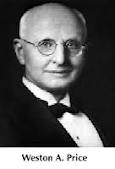Lessons From Weston Price and Traditional Diets

Weston A. Price was a dentist in the 1930's who wondered why we started getting cavities in children when we never did before. He decided to travel the world to cultures untouched by civilization and study them. He wanted to discover the factors responsible for good dental health. He was amazed when he found out that these societies not only had healthy teeth, but diabetes, heart disease and cancer were basically non-existent. He realized that the foods that these groups were eating had at least 4 times the amount of water-soluble vitamins and 10 times the fat soluble vitamins vs. the American diet of the time. They were eating lots of butter, fish eggs, organ meats, eggs and animal fats.
Dr. Price then watched what happen when processed foods (white flour, white sugar, and processed milk) started to be consumed in these societies. What he saw was an increase in cavities, diabetes, heart disease and cancer. Dr. Price’s observations of all these different cultures led to basic dietary guidelines, and dietary dangers, which I am listing for you here. Want to learn more check out his website at www.WestonAPrice.org
Weston A Price’s Dietary Guidelines:
Dietary Dangers of our Modern Society
Dr. Price then watched what happen when processed foods (white flour, white sugar, and processed milk) started to be consumed in these societies. What he saw was an increase in cavities, diabetes, heart disease and cancer. Dr. Price’s observations of all these different cultures led to basic dietary guidelines, and dietary dangers, which I am listing for you here. Want to learn more check out his website at www.WestonAPrice.org
Weston A Price’s Dietary Guidelines:
- Eat whole, natural foods.
- Eat only foods that will spoil, but eat them before they do.
- Eat naturally-raised meat including fish, seafood, poultry, beef, lamb, game, organ meats and eggs.
- Eat whole, naturally-produced milk products from pasture-fed cows, preferably raw and/or fermented, such as whole yogurt, cultured butter, whole cheeses and fresh and sour cream.
- Use only traditional fats and oils including butter and other animal fats, extra virgin olive oil, expeller expressed sesame and flax oil and the tropical oils—coconut and palm.
- Eat fresh fruits and vegetables, preferably organic, in salads and soups, or lightly steamed.
- Use whole grains and nuts that have been prepared by soaking, sprouting or sour leavening to neutralize phytic acid and other anti-nutrients.
- Include enzyme-enhanced lacto-fermented vegetables, fruits, beverages and condiments in your diet on a regular basis.
- Prepare homemade meat stocks from the bones of chicken, beef, lamb or fish and use liberally in soups and sauces.
- Use filtered water for cooking and drinking.
- Use unrefined Celtic sea salt and a variety of herbs and spices for food interest and appetite stimulation.
- Make your own salad dressing using raw vinegar, extra virgin olive oil and expeller expressed flax oil.
- Use natural sweeteners in moderation, such as raw honey, maple syrup, dehydrated cane sugar juice and stevia powder.
- Use only unpasteurized wine or beer in strict moderation with meals.
- Cook only in stainless steel, cast iron, glass or good quality enamel.
Dietary Dangers of our Modern Society
- Don't eat commercially processed foods such as cookies, cakes, crackers, TV dinners, soft drinks, packaged sauce mixes, etc.
- Avoid all refined sweeteners such as sugar, dextrose, glucose and high fructose corn syrup.
- Avoid white flour, white flour products and white rice.
- Avoid all hydrogenated or partially hydrogenated fats and oils.
- Avoid all vegetable oils made from soy, corn, safflower, canola or cottonseed.
- Do not use polyunsaturated oils for cooking, sautéing or baking.
- Avoid fried foods.
- Do not practice veganism; animal products provide vital nutrients not found in plant foods.
- Avoid products containing protein powders.
- Avoid pasteurized milk; do not consume low fat milk, skim milk, powdered milk or imitation milk products.
- Avoid battery-produced eggs and factory-farmed meats.
- Avoid highly processed luncheon meats and sausage containing MSG and other additives.
- Avoid rancid and improperly prepared seeds, nuts and grains found in granolas, quick rise breads and extruded breakfast cereals, as they block mineral absorption and cause intestinal distress.
- Avoid canned, sprayed, waxed, bioengineered or irradiated fruits and vegetables.
- Avoid artificial food additives, especially MSG, hydrolyzed vegetable protein and aspartame, which are neurotoxins. Most soups, sauce and broth mixes and commercial condiment contain MSG even if not clearly labeled.
- Avoid aluminum-containing foods such as commercial salt, baking powder and antacids. Do not use aluminum cookware or aluminum-containing deodorants.
- Do not drink fluoridated water.
- Do not drink distilled liquors.
Videos on How to Prepare Foods Traditionally from Weston Price website
Click links below for videos on preparing foods the traditional way:
1. Homemade Baby Formula
2 . Introduction to Traditional Eating
3. Traditional Fats and Sacred Foods
4. Journey Back to the Kitchen
5. Pantry Intervention
6. Natural Sweeteners
7. Salad Dressings and Sauces
8. Fermented Foods and Beverages
9. Proper Preparation of Grains and Legumes
10. Stocks and Soups
11. Healthy Snacks
12. Tips for Limited Time and Limited Budget
1. Homemade Baby Formula
2 . Introduction to Traditional Eating
3. Traditional Fats and Sacred Foods
4. Journey Back to the Kitchen
5. Pantry Intervention
6. Natural Sweeteners
7. Salad Dressings and Sauces
8. Fermented Foods and Beverages
9. Proper Preparation of Grains and Legumes
10. Stocks and Soups
11. Healthy Snacks
12. Tips for Limited Time and Limited Budget